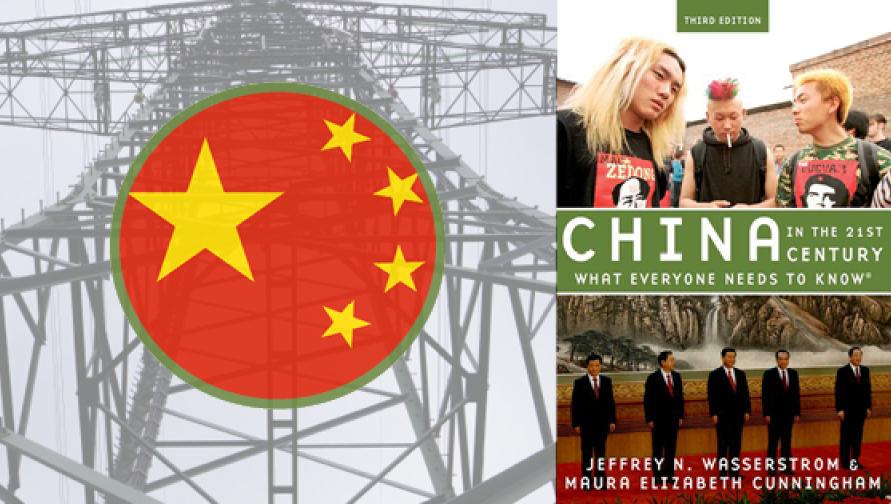
Jeffrey N. Wasserstrom, Chancellor’s Professor of history at the University of California, Irvine, and UCI alumna Maura Elizabeth Cunningham ’14 (Ph.D. history) have co-authored the third edition of China in the 21st Century: What Everyone Needs to Know (Oxford University Press, 2018), a detailed framework for understanding China’s history, its contemporary place on the worldwide stage and its future.
Building off of previous editions, Wasserstrom and Cunningham provide readers with introductions to the Chinese Communist Party, the building boom in Shanghai, and the environmental fallout of rapid Chinese industrialization; discuss unique aspects of Chinese culture and policy, including the one-child policy; and provide insight into Chinese-American relations, a subject that has become increasingly fraught during the Trump presidency.
Three particularly urgent additions to this book include: a focus on President of the People's Republic of China Xi Jinping's elevation to a status similar to Mao's by having his name written into a revised version of the country's constitution; new insights related to Hong Kong's 2014 Umbrella Movement and subsequent protests; and a focus on women and gender, including the persecution of feminists in recent years.
Below, Wasserstrom makes connections between China and the United States’ zeitgeists and answers why youth protests in China continue to matter.
Why does it matter that Xi Jinping was written into a revised version of the Constitution?
Xi Jinping's two predecessors, Jiang Zemin and Hu Jintao were, like him, both head of the Chinese Communist Party and China's head of state, but when I took trips to the country while they were in power, it was possible to spend time in a major city and not think much about either of them. Now, Xi's face sometimes seems to be everywhere. Books by and about him are displayed prominently in bookstores, whereas works like collections of Jiang and Hu's speeches weren't released until after their time in power ended. Having his name--not just a slogan or policy associated with him--added to the Constitution is further evidence of something closer to a personality cult than anything we have seen since Mao Zedong's time emerging in China. Even Deng Xiaoping, often described as China's most powerful leader since Mao, had to wait until death to get the sort of celebratory treatment that Xi is getting. The fact that the Constitution also now allows Xi to serve as President for longer than ten years—a development that happened soon after our book went to print—is very noteworthy as well. The ten-year term limits for President and Vice President were set in place in the 1980s as part of a series of moves away from one-man rule. This overt deviation from that policy is a dramatic development.
Why should people care about the 2014 Umbrella Movement?
The Umbrella Movement was very different from the mainland protests of 1989, as the earlier struggle, though associated with Beijing's Tiananmen Square, brought massive crowds to the streets of scores of Chinese cities, whereas the later one only played out in Hong Kong. Still, the Umbrella Movement was the biggest and most sustained urban-based mass movement to take place in the PRC in more than two decades. In addition, as in 1989, we saw students take bold actions to show that they felt a community they loved, in this case a city rather than a country, was being endangered by misgovernment. And in 2014, as in 1989, many people from other social groups expressed their support for educated youths struggling for change.
What is different about China's #metoo movement?
One distinctive thing about China's #metoo struggle is that it has been centered on campuses. Another is that, due to the much tighter control on criticism of powerful government figures, there has been no public discussion of sexual harassment committed by political leaders. A third contrast is that censors have moved to block discussion of the topic in the press and on social media. In China, though, people sometimes show great creativity in getting around censorship and this has happened now again, as people have gone online using the image of "Rice Bunnies" as a code name for #metoo. This works because there is a Chinese character meaning "rice" that is pronounced "mi" (as in "me") and a character for rabbit pronounced "tu" (as in "too"). Censors eventually catch on to these work-arounds, but for a time, they are very effective. When censors banned references to "June 4th" (due to that being the date of the 1989 massacre in Beijing), for a time bloggers called for people to remember the events of "May 35th," using an imaginary date to bring to mind a real one associated with brutal state violence.
Recent media stories by, and including, Wasserstrom and Cunningham:
The Conversation, April 2, 2018
Statesman, strongman, philosopher, autocrat: China's Xi is a man who contains multitudes (cross-posted on the San Francisco Chronicle and Business Standard)
CNN, March 10, 2018
Socialism with Chinese characteristics? Beijing's propaganda explained - Jeffrey Wasserstrom quoted
OUPblog, March 10, 2018
Women in China, past and present - co-authored by Jeffrey Wasserstrom and Maura Cunningham
Los Angeles Times, March 8, 2018
Want insight into China's political situation? Keep an eye on new animal memes – co-authored by Jeffrey Wasserstrom and Maura Cunningham
Wasserstrom and Cunningham kick off their book tour on March 20 in D.C. To learn more, visit:
http://bit.ly/China-BookTour
To purchase China in the 21st Century, visit http://bit.ly/UCIchina21

